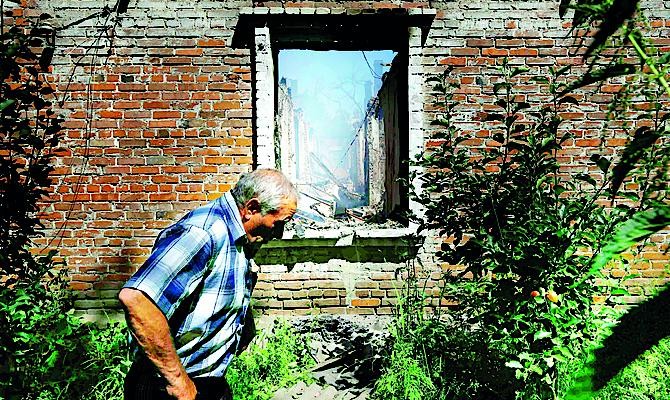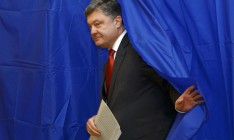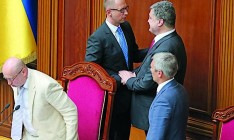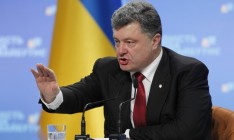Politics
maneuversThe Donbas will have to balance between war and truce

Yesterday, President Petro Poroshenko announced continuation of the anti-terrorist operation (ATO) in eastern Ukraine and termination of the truce. In such a manner, the head of state by his own decision resumed hostilities, which were suspended on June 20. Simultaneously, the president did not resort to the imposition of martial law and the transfer of power to the law enforcers in the region, leaving the possibility to declare a new truce and continue peace talks at any time.
Unhurried operation
Leaders of France, Germany and Russia, with whom Poroshenko had phone conversations this past Monday, insisted on prolongation of the truce. But after the meeting of the National Security and Defense Council (NSDC) the president declared continuation of the ATO. MP Yuriy Myroshnychenko believes that the decision of the head of state was affected by the position of the Maidan, which demanded resumption of hostilities in the east during its regular Viche (people’s assembly) on Sunday. “One could feel that Poroshenko was pressured and forced by the Maidan. Although he did not say that, his rhetoric was concordant with the demands of the last assembly on the Maidan,” said Myroshnychenko, who was one of the participants of Poroshenko’s meeting with MPs prior to declaration of termination of the truce on Monday.
Capital’s source in the Presidential Administration confirmed that Poroshenko made the decision to resume the operation in the Donbas before the meeting of the NSDC. But contrary to expectations, the president decided not to declare martial law in the two war ravaged oblasts in the Donbas region. In his address to the MPs Poroshenko mentioned the possibility of introduction of a special regime in the region, but it did not seem to be “a statement of a decision already made”, says Myroshnychenko.
Rejection of declaration of martial law split the pro-government coalition in the parliament yesterday. “For a while now there have not been anti-terrorist operations in the Donbas, but a full-blooded war and the martial law would strengthen the positions of the law enforcers. But at present it is unlikely that the president would dare to impose it,” said MP Ihor Myroshnychenko (Svoboda) in a conversation with Capital. Behind these statements representatives of the UDAR party saw an intention of their colleagues in the coalition to disrupt the early parliamentary elections on which Poroshenko insists. “It seems that among all the current public authorities Poroshenko is personally liable for the situation in the east. They are trying to shift the burden of unpopular decisions on Poroshenko. This is sure to affect his rating. Although, by the law the Cabinet is supposed to deal with the fight against terrorism,” said Serhiy Kaplin (UDAR) in an interview to Capital. As a reminder, the ATO started in the Donbas on April 13.
Poroshenko’s swings
Capital’s source in the UDAR faction said that imposition of the martial law would throw shadows on the legitimacy of the new Rada, early elections of which are demanded by the president. “Its legitimacy would be questioned if it includes no representatives of the Donbas. But most importantly, the imposition of martial law complicates negotiations aimed at resolving the situation,” he said. Ihor Myroshnychenko says that during the meeting of the president with parliamentarians they discussed the possibility of returning to the negotiations table. “The president said he was ready for new talks. Poroshenko added he would not reject such a format,” said Myroshnychenko.
Iryna Herashchenko, Poroshenko’s envoy to the peace plan for Eastern Ukraine, confirmed in a conversation with journalists that negotiations will continue. “A decision was made to resume the work of the so-called tripartite contact group. It cannot be ruled out that the next meeting of the group will take place not in the east of Ukraine, buy maybe in Minsk,” said Herashchenko. Belarusian Foreign Minister Vladimir Makei said that Minsk has not received any official request to provide a platform for negotiations, but that it is prepared to assist.
As a reminder, the first two rounds of negotiations in the OSCE – Russia – Ukraine format were held in Donetsk, where negotiators were joined by representatives of the DNR (Donetsk People’s Republic) and the LNR (Luhansk People’s Republic). During the last meeting, the parties agreed to extend the truce through June 30.
Political analyst Volodymyr Fesenko believes that in the near future the status quo in the East will balance on the brink of war and reconciliation. “Under the existing circumstances Poroshenko had no other choice but to terminate the truce and return to the active phase of the ATO. During June we saw a trend which, in my opinion, will continue in the future – eastern Ukraine swinging between war and truce,” said Fesenko at a press conference on Tuesday.
Poroshenko is explicitly avoiding drastic actions during the conflict in the Donbas, complains MP Myroshnychenko (Svoboda). “Everything will not be much different from the so-called truce. The troops have never received any decisive orders. The president will suspend the ATO when he pleases,” predicts Myroshnychenko.
This week the president promises to make submissions to the parliament for reshuffling the power bloc. In particular, this refers to the new leaders of the Defense Ministry and the General Staff. At the same time, no one mentions the change of senior management in the State Security Service (SBU) and the Ministry of Internal Affairs, which are responsible for the operation in the Donbas.






 of the agreement of syndication with Financial Times Limited are strictly prohibited. Use of materials which refers to France-Presse, Reuters, Interfax-Ukraine, Ukrainian News, UNIAN agencies is strictly prohibited. Materials marked
of the agreement of syndication with Financial Times Limited are strictly prohibited. Use of materials which refers to France-Presse, Reuters, Interfax-Ukraine, Ukrainian News, UNIAN agencies is strictly prohibited. Materials marked  are published as advertisements.
are published as advertisements.